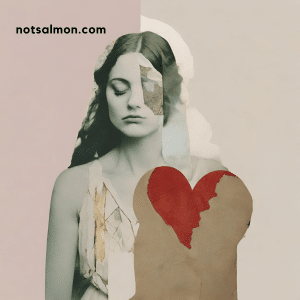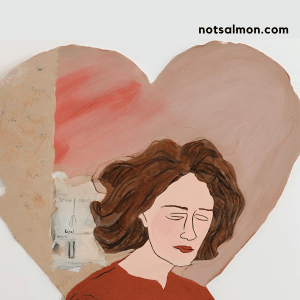 If you’re struggling to bounce back from a toxic relationship, here are tips to understand the types of toxic relationships and how to heal your heart.
If you’re struggling to bounce back from a toxic relationship, here are tips to understand the types of toxic relationships and how to heal your heart.
Toxic relationships are mentally draining and can affect both one’s mental and physical health. Meaning? They can not only lead to depression and anxiety, they can also lead to serious life illnesses.
Fortunately, bouncing back is possible.
First of all, a big congratulations for leaving your current predicament. You took a brave step towards maintaining your emotional well being.
But after you leave, you must put in the work to healthfully process your emotions and manage your stress and anxiety.
This healing route takes time. However, take this time is an essential step towards fully bouncing back from your broken heart.
In this article I will help you to understand the kind of toxic relationship you were in, so you can better process what you went through. Plus I will give you effetive strategies to bounce back from this toxic love and heal your heart.
I’m writing this article because I am the bestselling relationship author of the book Prince Harming Syndrome – which was recommended on Oprah. Plus I also founded the therapist recommended self-paced course: Broken Heart Recovery.
I am committed to sharing tools to help people heal and move on from toxic partners. So let’s get started!
What Is a Toxic Relationship?
A healthy relationship demonstrates honesty, open communication, trust, commitment, and love. It’s a connection where partners make an effort and compromise for each other. There might be some disagreements, but there is a clear route to solving these conflicts.
Partners in a healthy relationship respect each other’s independence, with the power to make solitary decisions to improve the situation. This is with respect or without fear of the other partner’s thoughts about sentiments.
On the other hand, toxic ones often experience constant conflicts that often go unsolved. Continuous exposure to this relationship often drains the partner with feelings of unhappiness. A partner persists with a certain behavior that negatively affects their partner.
One partner feels invalidated, isolated, underappreciated, and stressed. A toxic environment builds up subtly. Eventually, partners start feeling resentful, stressed, and overwhelmed. The next solution is leaving the relationship.
The relationship feels no longer viable, though love for the other partner still exists. This confusion about whether or not to leave a relationship makes the entire process feel like hell. These are classic signs of being exposed to a toxic relationship.
Toxic vs. Abusive Relationships
 Two terms often misused when explaining relationships are toxic relationships and abusive relationships. However, there is some overlap between toxic and abusive relationships. In essence, toxic is not always abusive, but abusive amounts to toxic.
Two terms often misused when explaining relationships are toxic relationships and abusive relationships. However, there is some overlap between toxic and abusive relationships. In essence, toxic is not always abusive, but abusive amounts to toxic.
A toxic relationship contains signs of manipulation and the feeling of being taken advantage of. One partner tries to control everything or keeps being mean to the other. It’s a slow-paced emotion that deteriorates love and respect.
On the other hand, abusive relationships are physical. It’s when someone intentionally hurts the other with cruel words or physical. Victims of an abusive relationship include various traits such as:
- Anxiety
- Injuries
- Financial problems
- Suicidal tendencies
- Depression
- Addiction
Understanding the differences between the two terms strikes a balance between a relationship with a troubled connection and one that needs immediate departure for one’s personal well-being.
Whether it’s a toxic or abusive one, victims of these relationships need attention. Continued exposure to these relationships causes severe damage to one’s personality.
Types of Toxic Partners
 Most toxic relationships come from one toxic person taking advantage of the other or both partners sabotaging the relationship. Most therapists reveal that most toxic relationships come from one partner trying to control the other.
Most toxic relationships come from one toxic person taking advantage of the other or both partners sabotaging the relationship. Most therapists reveal that most toxic relationships come from one partner trying to control the other.
A common trait attributed to controlling partners is ‘love bombing’ during the early stages of the relationship. These partners often overcompensate for their controlling behavior with constant contact and grand gestures.
Here is a look at different traits of toxic partners that are often attributed to toxic relationships:
1. Charmers
The ‘honeymoon’ stage of any relationship is exciting as the romance is at an all-time high. Similar to signing up for a paper writing service online, you’d expect top-quality service and attention from your partner.
This is where the charmers take control of the relationship while ‘love bombing’ their other partners. They have a certain attractive enigma with a silver tongue capable of making everything seem okay.
Their magnetic personality often draws in their partner while overlooking common red flags. These charmers are masters of manipulation, capable of toying with one’s emotions to their advantage. Often, there is a line of insecurities and fears they are trying to hide.
2. Emotional Manipulator
An emotional manipulator subtly twists relationship dynamics to their advantage. Most of these manipulators play the victim card while making the other partner feel guilty about their actions.
Other times, these manipulators gaslight their partners while undermining the reality of the situation. They are masters of undermining your feelings in a relationship. These manipulators deflect blame while flipping situations to make the other partner appear like the wrongdoer.
Sometimes, these partners make promises without the intent of fulfilling them. It often leaves the other partner in a state of uncertainty. The interplay between charm and cruelty often leaves the other partner questioning their judgment or actions. The other partner must be aware of these traits to achieve emotional freedom.
3. Micromanager
A micromanager in a toxic relationship often feels the overwhelming need to control each aspect of the relationship. These partners take on making important decisions that define the relationship. Some decisions include a place to eat, investment decisions, style choices, or choices of friends.
A common trait for these partners is constant monitoring and questioning of their daily life. These partners have a controlling nature over your life. They want every detail of your life firsthand. This often crosses boundaries and invades your personal space.
In addition, micromanagers tend to criticize decisions made by their partners. It involves picking out flaws, including their partner’s decisions, behavior, and overall appearance. These criticisms stem from their need to control and dominate the relationship.
4. Gaslighter
Gaslighting is a form of emotional abuse where one partner manipulates their partner to believe their thoughts or feelings as the truth. They create a false narrative that makes their partners question their reality or judgment.
The end goal of gaslighting is for a victim to become unsure of their realities and question their perceptions. Continued exposure to gaslighting makes one unaware of one’s true self, thoughts, and perception of reality.
A common trait when gaslighting is habitual lying, which often exposes their narcissistic tendencies. Their manipulation skills can turn your feelings about a topic even when you’ve evidence.
Signs of a Toxic Relationship
 Most victims often lack the power to notice signs of a toxic relationship. Below is a breakdown of some common signs exhibited in a toxic relationship:
Most victims often lack the power to notice signs of a toxic relationship. Below is a breakdown of some common signs exhibited in a toxic relationship:
- Persistent criticism
- Stress
- Unhappiness
- Mood swings
- Constant resentment
- Jealousy and passiveness
- Emotional and verbal abuse
- Feeling exhausted and drained
Tips to Recover From a Toxic Relationship
There is no specified length for recovering from a toxic relationship. Below are techniques to adopt when recovering from these relationships:
1. Go Through Your Emotions
Abandoning a toxic relationship often evokes deep emotions, including stress, pain, and confusion. At first, it’s a sigh of relief coming from an unhealthy relationship, but most people try to avoid the emotions.
Let yourself go through the painful experience and let it become a lesson. Stifling your emotions lets them come back later. Thus, it elongates your healing timeline.
2. Find a Support System
Facing this challenging period by yourself is tough. It’s the perfect time to reach out to a support network for love and care. Contact your close relatives, soulmates, counselors, and your local therapist.
Surround yourself with caring individuals who comprehend your situation. This support network provides a secure space to express your feelings, offering the courage, motivation, and encouragement you require.
3. Prioritize Self-Care
Most victims of toxic relationships often find less time for self-care due to the previous nature of their relationship. Sometimes, it’s good to dedicate time to tend to yourself. Go out on a shopping spree while participating in your hobbies.
Go to the beauty shop and fix your nails, toes, and hair. Feel good about yourself again. Engage in other activities to take your mind off the relationship. Reconnect with your passions, family, and friends.
4. Don’t Seek Closure
You probably won’t get an apology from your toxic partner. Therefore, there’s no need to seek closure from them. Your partner is likely too toxic to be aware of their wayward ways and won’t take responsibility for their behavior.
If there’s a need to process your closure, write down a letter detailing all your deep emotions. The writing process helps in processing your experience in the previous relationship. Later, shred or delete the letter.
5. Consult a Professional
Sometimes, we might experience severe effects of a toxic relationship, like post-traumatic stress disorder. Moreover, these effects might extend into your other relationships, creating mistrust or feelings of isolation.
It’s time to call in a mental health professional to process your situation. With this in mind, I encourage you to bring me onboard as your 1-on-1 Master Mindset Coach.
I will help you to recognize unhealthy patterns derived from the toxic relationship – and break them.
Final Takeaway: How to Heal from a Toxic Relationship
Continued exposure to toxic relationships is detrimental to your overall health. It’s advised to end things, but having a plan to move forward in your life is crucial. If you want a deeper exploration of how to heal your heart after a post-toxic relationship.., check out my bestselling audio and video program: “The Broken Heart Recovery Course!“
Think happier. Think calmer.
Think about subscribing for free weekly tools here.
No SPAM, ever! Read the Privacy Policy for more information.
One last step!
Please go to your inbox and click the confirmation link we just emailed you so you can start to get your free weekly NotSalmon Happiness Tools! Plus, you’ll immediately receive a chunklette of Karen’s bestselling Bounce Back Book!


 If you’re struggling to bounce back from a toxic relationship, here are tips to understand the types of toxic relationships and how to heal your heart.
If you’re struggling to bounce back from a toxic relationship, here are tips to understand the types of toxic relationships and how to heal your heart. Two terms often misused when explaining relationships are toxic relationships and abusive relationships. However, there is some overlap between toxic and abusive relationships. In essence, toxic is not always abusive, but abusive amounts to toxic.
Two terms often misused when explaining relationships are toxic relationships and abusive relationships. However, there is some overlap between toxic and abusive relationships. In essence, toxic is not always abusive, but abusive amounts to toxic. Most toxic relationships come from one
Most toxic relationships come from one  Most victims often lack the power to notice signs of a toxic relationship. Below is a breakdown of some common signs exhibited in a toxic relationship:
Most victims often lack the power to notice signs of a toxic relationship. Below is a breakdown of some common signs exhibited in a toxic relationship: